Essay On My Favourite FestivalIndia is a festival-filled country. Many festivals are celebrated here with considerable fanfare and spectacle. Every festival has a religious or mythological story associated with it. Diwali, also known as the Festival of Lights, is celebrated in every corner of India. It is an Indian festival that celebrates the triumph of virtue over evil. It is a celebration that Hindus take very seriously and take pride in. This festival celebrates the happiness, peace, and triumph of Lord Rama. It commemorates Lord Ram's return from exile, as portrayed in the epic Ramayana. 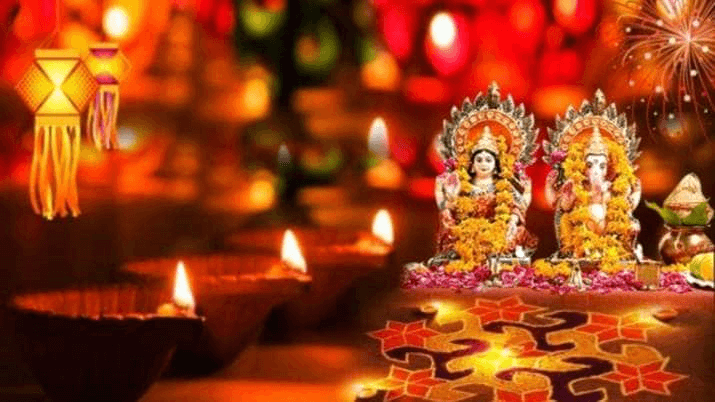
Deepavali, also called Diwali, is a festival of light where Deep means light and Avali denotes an array of lights. As a result, this event is commemorated by lighting earthen lamps or series bulb throughout the home/office. It also represents light triumphing over darkness. Diwali is generally celebrated in October or November, 20 days following Dussehra; according to the Hindu calendar, it is observed during the month of Kartika. 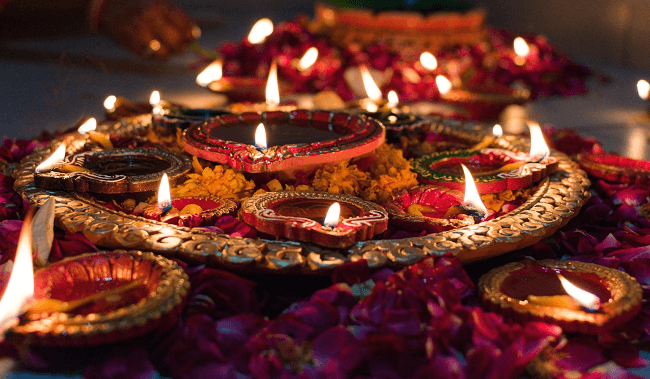
Story Behind Diwali CelebrationIt is one of the largest and most significant festivals, primarily celebrated in India. Diwali is a festivity that celebrates joy, triumph, and unity. It is observed 20 days following the Dussehra celebration ( a celebration of the Hindus where it is believed that Lord Rama defeated and killed the demon king Ravana). The term 'Deepavali' is a Hindi word that implies a collection of lamps. Diwali has celebrated in the memory of Lord Rama because it was on this day that Lord Rama returned to Ayodhya after a 14-year exile. During his exile, he fought demons and the demon king Ravana, who was the mighty ruler of Lanka at the time. He kidnapped Goddess Sita, who Lord Rama rescued with the help of Hanuman and his army. People in Ayodhya lit diyas to greet Rama and celebrate his triumph upon his homecoming. Since then, Diwali has been celebrated to commemorate the triumph of good over evil. CelebrationIt is a celebration of joy and happiness in India. The event preparations begin many days before the festival. It all starts with a thorough cleaning of homes and businesses. Many individuals also get rid of outdated household objects and complete all renovations before the event begins Its celebration starts two days beforehand and continues for the other two days following other minor festive rituals. Dhanteras is the first pre-celebration of Diwali, where people buy gold, silver or any metal-related goods as it is considered auspicious that will bring prosperity to their home. On the first day, it is customary to purchase new stuff, mainly decorations. The next day is the Narak Chaturdashi or Choti Diwali, where people light a single Diya outside their house to avoid negativity. Then the next day comes the principal celebration of Diwali people light up their homes and business offices, prepare great food, give gifts, and spread joy. On the third day of the five-day celebration, i.e. Diwali, Goddess Lakshmi (Goddess of Wealth) and Lord Ganesha ( God of Prosperity and Happiness) is worshipped with tremendous devotion. Lord Ganesha, regarded as the destroyer of obstacles, is revered for his knowledge and intellect. On Diwali, Goddess Lakshmi is also worshipped for wealth and success. The Diwali puja is meant to invoke the deities' favour. Many people in the different regions of India believe Diwali to be the start of their fiscal year. On Diwali night, Goddess Lakshmi is believed to visit people's homes and bless them. As a result, all devotees clean and adorn their homes for the festival with fairy lights, flowers, rangoli, candles, diyas, garlands, and so on. The festival is typically held over three days. It is also customary to visit friends and family and give presents. On this day, several sweets and Indian specialties are made. Dhanteras, Naraka Chaturdashi, Lakshmi Pooja, Govardhan Pooja, and Bhai Dooj are the five days. Diwali preparations are extremely significant to Indians. People begin buying new clothes, gifts, new books, lights, crackers, sweets, dried fruits, and so on during the month of Diwali celebration, the actual date of the festival. Some people believe in getting rid of old things and replacing them with new ones once a year. This also includes throwing away unwanted old objects at home and purchasing new ones on the occasion of Diwali so that the festival brings in everything new and fresh. On Diwali, Goddess Lakshmi is said to visit and bless places of worship (such as a home or business). As a result, the celebration of this holiday requires a great deal of discipline and commitment. On the celebration day, courtyards are decked with colourful rangoli, and lamps are placed atop the rangoli. People wear new outfits, consume delicacies, light lamps, and burst crackers as the sun sets. Crackers not only create a lot of noise, but they're also a lot of fun to play with throughout the festival. However, due to environmental pollution, it is best not to burn too many crackers, and they are also not safe because they are comprised of dangerous materials. There have been several reports of children injuring themselves when popping crackers. It is critical to only break crackers under adult supervision. It is also recommended to limit the number of crackers you explode because they produce a lot of air and noise pollution. Animals are also frightened by noise. We should not forget about the ecosystem and the creatures during the celebration that these crackers do affect. We can still enjoy the celebrations with the lights. We should also consider the local vendors and small businesses and should help them by buying their products like earthen lamps, idols of god to worship, items of decoration etc. To keep the tradition alive, we may just pop a few crackers and celebrate in an eco-friendly manner. Diwali is a celebration that everyone enjoys. We often forget that exploding crackers cause noise and air pollution throughout the holiday season. It may be extremely hazardous to children and possibly result in severe burns. Bursting crackers lowers the air-quality index, especially in northern India, and visibility in many areas contributes to accidents frequently recorded following the celebration. As a result, it is critical to have a safe and environmentally responsible Diwali. Importance of Celebration of Diwali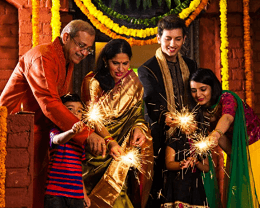 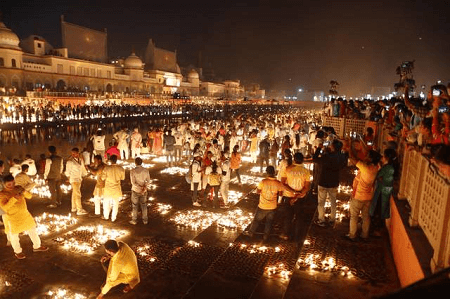 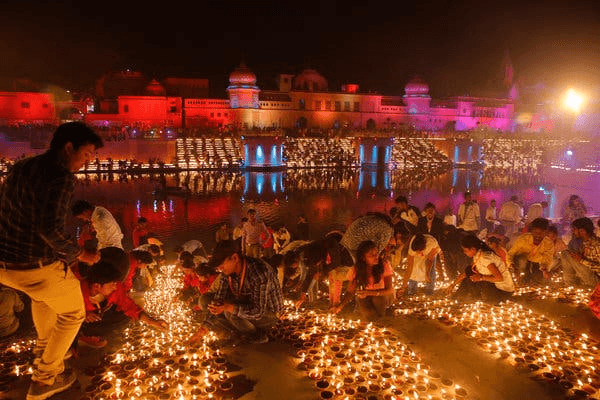
Deepavali is a Hindu festival that is observed all over the world by the Hindus living aboard. It reflects several elements of life and creation. Deepavali is celebrated to commemorate the triumph of light over darkness and good over evil. Hindus light candles and other lamps on this day to welcome the Deepavali is a light festival held on the new moon day (Amavasya) of the Hindu calendar in the month of Kartik. It is a five-day festival that begins with the lighting of lamps and candles and continues with gift-giving, eating, and family reunions. Deepavali emphasises the concept of family values, peace, and unity. It is a time when everyone gathers to rejoice by exchanging presents and praying for prosperity and peace on Earth. This well-known Hindu festival represents wisdom triumphing over ignorance and charity triumphing over greed. Deepavali, commonly known as Diwali, is an annual Hindu celebration in which lamps and candles are lit. It commemorates the triumph of light over darkness. The day has religious importance for Indians and is an opportunity to brighten the darkness. It is one of the fun festive seasons that everyone enjoys. The Indian Hindu community is quite proud of its festivities. There is a large crowd, and there is music, dancing, and fireworks. On the occasion of Diwali, lights are turned on in the streets, and we enjoy being shopping spree on Diwali day. Diwali is celebrated with tremendous excitement and happiness not just in India but also in other Asian nations and around the world. ConclusionIt is appropriately named Diwali since the entire world lights up on this day of the celebration. Because the event offers joy, it is my favourite festival. Many satellite photos depict how India appears during Diwali. Diwali is now a global celebration celebrated by Indians worldwide with lightning diyas and lights. So let us all join hands and swear to enjoy this ancient celebration responsibly so that everyone, including Mother Earth, is safe and pollution-free.
Next TopicEssay On Science
|
 For Videos Join Our Youtube Channel: Join Now
For Videos Join Our Youtube Channel: Join Now
Feedback
- Send your Feedback to [email protected]
Help Others, Please Share









